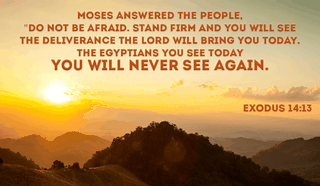
- Recent Translations
- All Translations
Exodus 14:30
Share
Settings
Exodus 14:30 Meaning and Commentary
Thus the Lord saved Israel that day out of the hand of the
Egyptians
For though it was now six or seven days since they had leave to go out of Egypt, and actually did depart, yet they could not be said properly to be saved, or to be in safety, till this day, when all the Egyptians their enemies were destroyed, that pursued after them; and this was the twenty first day of the month, and the seventh and last day of the passover, and was an holy convocation to the Lord; (See Gill on Exodus 12:16) and Israel saw the Egyptians dead on the sea shore;
all along, as a late traveller F8 observes, as we may presume, from Sdur (or Shur) to Corondel, and at Corondel especially, from the assistance and termination of the current there. The word for "dead" F9 is in the singular number, and joined with a plural may denote that they saw everyone of the Egyptians dead, since they were all destroyed, and not one remained of them, as in ( Exodus 14:28 ) . Aben Ezra thinks the sense of the words is, not that the Egyptians were seen dead upon the sea shore, but that the Israelites standing upon the sea shore saw the dead bodies of the Egyptians, that is, floating on the waters of the sea; but rather the meaning is, that their dead bodies were by the force of the waters cast upon the shore, and there beheld and plundered by the Israelites. Josephus F11 observes, that the day following (that night the Egyptians were drowned) the arms of the Egyptians being cast on the shore where the Hebrews encamped, through the force of the sea and wind, Moses gathered them up and armed the Hebrews with them; and this will account for it how they came to have arms, since it is highly probable they came out of Egypt unarmed; and how they could fight battles as they did in the wilderness, and when they came into the land of Canaan.
F8 Shaw's Travels, p. 314. Ed. 2.
F9 (tm) Mortuum, Montanus, Drusius.
F11 Antiqu. l. 2. c. 16. sect. 6.
